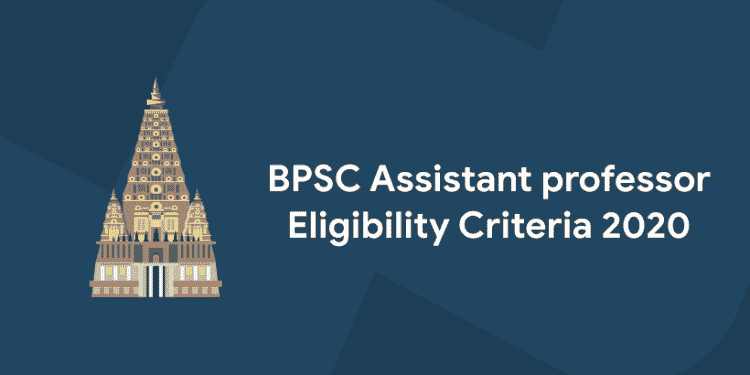Table of Contents
Public Service Commissions of each state holds exams to give government jobs to its residents. One such post offered by the Bihar PSC is Assistant Professor. Just like how not everyone can join in for any exam, even this one has a certain set of eligibility criteria.
BPSC Assistant Professor
Eligibility Criteria
As mentioned earlier, even this exam has a certain eligibility criteria that involves a minimum age and some educational qualification and experience.
Educational Qualification and Experience:
The candidate wishing to write the exam must have at least E/B.Tech/B.S/B.Sc (Engg.) and M.E/M.Tech/M.S or integrated M.Tech in Electrical Engineering with first class or Equivalent in any one of the degrees.
Age Limit:
There is not much of an age limit to this exam other than the fact that you must be at least 18 to write the exam. so everybody is welcome to try their luck and their preparation for the post.
Registration
The starting date of registration is 13 July 2020 so as of this blog being published, it’s already begun. So hurry up! The last date of registration is 30 July 2020 but try not to procrastinate too long. The last date for submitting online application fee is 07 August 2020 and the last date to apply online is 14 August 2020. You still have to submit the print-out of online application and other documents and the deadline for that is 24 August 2020.
Vacancies
The post of BPSC Assistant Professor has 287 vacancies of which some are reservations to ensure fairness.
- General – 116
- Economically Weaker Section (EWS) – 29
- Backward Class (BC) – 35
- Economically Backward Classes (EBC) – 50
- Backward Class (Female) – 09
- Scheduled Class (SC) – 45
- Scheduled Tribes (ST) – 03
Start your preparations today!
Salary
The pay scale for the BPSC Assistant Professor is known to be around Rs. 57700. Could vary sometimes.
Selection Process
The selection process for the post is based on:
- Academic Record (20 Marks) – Maximum 10 (10% of Percentage Marks obtained in M.Tech/M.E/M.S in relevant branch/subject). Maximum 5 (5% of Percentage Marks obtained in B.Tech/B.E /B,S/B.Sc(Enes.). PhD – 5 Marks
- Written Exam (Objective Type – 40 Marks) – For Engineering stream, however, the syllabus of Graduate Aptitude Test in Engineering (GATE) will also be applicable
- Interview (15 Marks)
- Assistant Professor (25 Marks) – Weightage to candidates working on contract basis on the post of Assistant professor under Department of Science & Technology and possessing minimum eligibility-criteria @05 marks per year (Maximum 25 marks)
Application Fees
- SC of Bihar /ST of Bihar /Woman of Bihar of Bihar /Handicapped/Permanent residents of Bihar (All Category) – Rs 200/-
- Other – Rs. 750/-
Syllabus
One of the most important things is the syllabus. The main syllabus comprises of 8 different sections namely:
- Engineering Mathematics
- Linear Algebra
- Calculus
- Differential Equations
- Probability and Statistics
- Numerical Methods
- Complex Variables
- Transform Theory
- Power Electronics
- Power generation concepts
- AC and DC transmission concepts
- Models and performance of transmission lines and cables
- Series and shunt compensation
- Electric field distribution and insulators
- Distribution systems, etc
- Analog and Digital Electronics
- Characteristics of diodes: BJT, MOSFET
- Simple diode circuits: clipping, clamping, rectifier
- Amplifiers: Biasing, Equivalent circuit and Frequency response
- Oscillators and Feedback Amplifiers
- Operational Amplifiers: Characteristics and applications, etc
- Electric Circuits
- Network graph
- KCL & KVL
- Node and Mesh analysis
- Transient response of dc and ac networks
- Sinusoidal steady-state analysis
- Resonance, etc
- Electromagnetic Fields
- Coulomb’s Law
- Electric Field Intensity
- Electric Flux Density
- Gauss’s Law
- Divergence
- Electric field and potential due to point, line, plane and spherical charge distributions, etc
Worried about the syllabus? Let us help you!
- Electrical and Electronic Measurements
- Bridges and Potentiometers
- Measurement of voltage, current, power, energy and power factor
- Instrument transformers
- Digital voltmeters and multimeters, etc
- Control Systems
- Mathematical modeling and representation of systems
- Feedback principle
- Transfer function
- Block diagrams
- Signal flow graphs, etc
- Signals and Systems
- Representation of continuous and discrete-time signals
- shifting and scaling operations
- Linear, time-invariant and causal systems, etc
Since there will be many people joining it means you’ll have more competition for the exam. The Entri App could help you come out on top and secure your post as an assistant professor. Keep learning and have a nice day! 🙂











